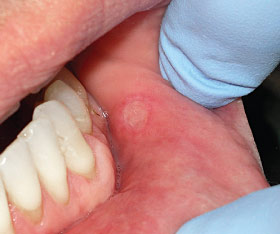Mouth Sores
Understanding and treating canker sores (aphthous ulcers)
Dear Doctor,
Small sores in my mouth have troubled me for years. I get them in my cheeks and under my tongue. They come and go after a week or so. What are they, and what can be done?

Dear Joan,
Given the location and the symptoms of the small sores you describe, you probably have what are called aphthous ulcers, more commonly known as canker sores. The term “aphtha” means ulcer, literally a break in the skin or mucosa, the lining membranes of the mouth. Aphthous ulcers occur most commonly on movable thinner oral membranes — inside the cheeks, lips and under the tongue, and even on the soft palate at the back of the throat. They rarely occur on tougher more resilient tissues like the gums, surface of the tongue and hard palate.
Common Sores
Aphthous ulcers are most commonly round in appearance with a yellow-gray center and a fiery-red border or “halo.” They are characterized by a tingling or painful sensation anywhere from a few hours to two days before the ulcer/s appear. They may appear during periods of anxiety and stress, when your resistance may not be at its best, and may also be initiated by minor trauma. Canker sores generally persist for a week to ten days and are healed by two weeks, but they can be quite painful and annoying, especially when eating and drinking.
Recurrent aphthous stomatitis (RAS) (“stoma” – mouth; “itis” – inflammation) is distinguished by its tendency to recur with multiple ulcers, which are almost always painful. RAS is one of the most common oral conditions. It affects up to 20-25% of the general population, more frequently women than men. The ulcers usually begin in adolescence and frequently occur in immediate family members. If both parents have the condition, their children have an approximate 90% chance of developing it too.
“Herpetiform aphthae,” which are characterized by small clusters of ulcers, are so-called because they have a similar appearance to ulcers caused by the herpes simplex virus. However ulcers from the herpes virus occur more frequently on the gums and/or hard palate, among other signs and symptoms, which distinguish them from RAS.
RAS ulcers are also characterized on the basis of size; when ulcers are less than a centimeter, they are referred to as “minor,” and when more than a centimeter as “major.” The larger ulcers tend to be more painful and slower to heal.
There is no clear cause for aphthous ulcers (canker sores) and they are not contagious.
There is no clear cause for aphthous ulcers and they are not contagious. Research has shown a correlation with abnormalities of the immune (resistance) system, the process by which the body responds to and fights against infection and disease. In some cases, there may be a dietary or dental product connection. Pain from canker sores can be initiated or triggered by certain foods, which are acidic in nature, like citrus, tomato sauce, or even spicy/seasoned foods. In other cases, underlying medical conditions have been associated with RAS (for example, vitamin deficiencies, anemia, and gastrointestinal (“gastro” – stomach; “intestinal” – digestive tract) diseases. Interestingly, RAS is more commonly seen in non-smokers and may worsen in people who have recently stopped smoking tobacco. A more severe form of RAS may also be associated with immune system disorders like Behcet's syndrome, a rare blood vessel disease.
Soothing the Sores
There are several over-the-counter (OTC) products available to help manage mild cases of RAS. Some cover the ulcers, providing protection while they heal; others numb the area temporarily. Prescription options include topical steroids, in gels or rinses, by injection and/or systemic (through the body) medications. The goals of treatment are to decrease severity of pain, frequency and duration of the ulcers and to promote healing more quickly.
Mouth sores should be taken seriously. You should seek dental or medical evaluation if:
- A mouth ulcer or sore has not healed within 2 weeks
- There is an increase in the severity, frequency or duration of the condition
- You are never without a mouth sore
Ulcers or sores that do not heal properly may need to be biopsied, which involves taking a small sample of tissue to be viewed under a microscope, to rule out underlying medical conditions like skin disease, precancer and/or cancer. Other tests including blood tests may also be needed to make a proper diagnosis.
Based on your description, I suspect that you have aphthous ulcers — canker sores and may benefit from trying some OTC products. You may even find that keeping a record of your diet, dental products you use, and lifestyle may help to uncover a connection with this condition. However, if any mouth sore does not heal properly and/or your symptoms are getting worse, please seek dental or medical evaluation. A consultation would help to make sure that the mouth sores are not related to an underlying medical condition while offering an opportunity to provide appropriate medication.



